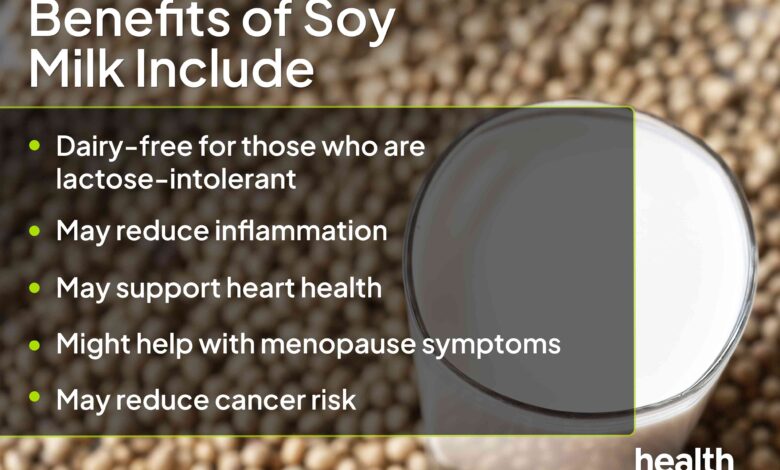Is Soy Milk Good for You? Benefits, Nutrition, Risks

:max_bytes(150000):strip_icc():format(jpeg)/HDC-is-soy-milk-good-for-you-e53d5c36cfd44f3588c4221469681955.jpg)
Soy milk, also known as soy drink, is made from soybeans. It’s vegan and lactose-free, making it a popular alternative to cow’s milk.
Soy milk is low in calories and saturated fat and contains plant-based protein and beneficial compounds. It may also reduce inflammation and cancer risk and support a heart-healthy diet.
You can make soy milk at home. There are also many varieties on the market, with different nutritional profiles and ingredients.
Soy milk is non-dairy and lactose-free, making it a good option for people who cannot have lactose or dairy due to an intolerance or allergy.
Soy milk is a plant-based beverage that is a good alternative for people who choose not to consume animal products like cow’s milk. It provides a good source of protein for people following a vegan diet.
Soybeans are high in antioxidants, which help eliminate harmful compounds called free radicals. A diet high in antioxidants can help lower inflammation.
Studies also show that soy supplements may reduce levels of C-reactive protein (CRP), a marker for inflammation in the blood. However, the study only involved women who had gone through menopause (when periods stop happening).
Soy milk is low in saturated fat and provides a good source of plant-based protein, making it great for heart health. In one study, eating soy products four or more times a week was linked to a lower risk of dying from heart disease. However, the effects were not the same in people who already had a history of heart disease.
In a review examining the health effects of switching from cow’s milk to soy milk, researchers found that this change lowered blood cholesterol and blood pressure levels.
During menopause, estrogen levels decrease. Hormonal changes can cause menopause symptoms like hot flashes, night sweats, mood swings, vaginal dryness, and lack of sleep quality. Soy contains isoflavones, which have a similar structure to estrogen and can act like estrogen in the body.
Some research suggests soy isoflavones could help with menopause symptoms. One study found that women experiencing menopause and perimenopause (the transition period into menopause) had improved physical and mental symptoms after taking a 40-milligram soy isoflavone supplement twice daily for 12 weeks.
Another study had peri- and postmenopausal (after menopause) women consume the soy drink ViveSoy—which contains high levels of isoflavones—daily for 12 weeks. The study found the women had reduced symptoms and improved quality of life.
Both of these studies used a concentrated isoflavone treatment rather than regular soy milk, so it’s unclear if drinking soy milk would offer the same benefit. Some of the research is also mixed.
In one review, researchers found that soy supplements increased estradiol levels, a primary form of estrogen, but did not reduce hot flashes. Another study investigated how soy drinks with varying levels of isoflavones affected menopause symptoms over three months, finding that none of the doses improved symptoms.
More research is needed to determine whether soy can improve menopause symptoms and how effective these compounds are in foods compared to dietary supplements.
Researchers have linked higher soy milk intake to a lower risk of cancer. Eating other soy products might also reduce the risk of some cancers, including breast, gastric, prostate, and liver cancer.
Isoflavones in foods are considered safe. However, supplements may have higher levels of these compounds—much more than what you get from food. Consult your healthcare provider before taking isoflavones or soy supplements, especially if you have cancer or a chronic disease.
One cup (224 grams) of unsweetened soy milk contains:
- Calories: 92.7
- Protein: 8.6 grams (g)
- Fat: 5.1 g
- Saturated fat: 0.7 g
- Unsaturated fat: 3.8 g
- Sodium: 83 milligrams (mg)
- Carbohydrates: 3.1 g
- Sugars: 1.3 g
- Vitamin A: 142 micrograms (mcg), or 16% of the Daily Value (DV)
- Magnesium: 54 mg, or 13% of the DV
Soy milk is a good source of vitamin A and magnesium. It also contains small amounts of potassium, folate, and selenium. Soy products are high in compounds such as isoflavones.
Fortified soy milk also commonly includes added nutrients like calcium and vitamins A and D. A fortified soy milk has 300 milligrams of calcium per cup, which is 23% of the DV for calcium. It also provides 11% of the DV for vitamin D and about 16% for vitamin A.
Look at the ingredients and nutrition labels to choose the right soy milk for you. Nutrition can vary depending on how it’s processed, the ingredients used, and the nutrients added.
Most people can safely eat soybeans and soy products. However, soy is a common food allergen, so people with soy allergies should avoid all soy products, including soy milk.
Here are a few risks of soy milk to consider:
- Soy allergy: If you’re allergic to soy, do not consume soy milk. If you experience symptoms of an allergic reaction, such as hives, tingling or itching in the mouth, facial swelling, or difficulty breathing, seek immediate medical help.
- Added sugar: Some soy milk products contain a lot of added sugar. A cup of sweetened soy milk has about 11 grams of sugar, while the unsweetened version has just around 1 gram.
- Gastrointestinal symptoms: Some people may experience digestive issues, such as an upset stomach, diarrhea, or constipation, after eating soy products.
Health Concerns About Soy: What Science Says
Soy milk contains many compounds. There is some misinformation about the harmful effects these compounds can cause. Here are the most common health concerns related to soy and the science behind them:
- Thyroid function: Soy contains goitrogens, compounds that inhibit the enzyme that makes thyroid hormones. Research shows the effects are not likely to be strong. People with thyroid conditions may notice small changes in their thyroid-stimulating hormone (TSH) levels when consuming soy regularly. This hormone rises in response to a drop in thyroid hormone levels.
- Cancer: Some people think soy can lead to cancer, but research shows otherwise. Studies connect soy products to a lower risk of cancers, including breast and prostate cancer.
- Estrogen-like effects in men: Some people think eating soy can boost estrogen levels in men, causing them to develop feminine traits. However, this is not supported by science. A research review showed no effects on either testosterone or estrogen levels in men who consumed soy products or isoflavone supplements.
You can make soy milk at home by soaking soybeans in water for at least 12 hours and changing the water a few times. Blend the soaked beans with fresh water in a food processor, then filter the mixture through a clean fabric.
You can add sweeteners or flavorings to your soy milk, such as honey and vanilla extract. Soy milk can be used for coffee, smoothies, baked goods, or sauces.
Homemade soy milk can contain more beneficial compounds than store-bought versions, but it has a shorter shelf life and is more prone to bacterial growth. Store-bought products undergo pasteurization and processing, so they usually stay fresh on the shelf until opened.
There are many types of soy milk on the market, including:
- Regular soy milk: Similar to the homemade version, some brands offer soy milk that contains only soybeans and water.
- Unsweetened soy milk: These options contain no added sugars and often say “no added sugars” on the label.
- Light soy milk: These have no more than 1.5 grams of fat per 100 milliliters, which is 30% fewer calories than the original product.
- Flavored soy milk: Soy milk is available in flavors like chocolate, vanilla, and cappuccino. Keep in mind that these products often have additives.
- Fortified soy milk: Soy milk usually contains added nutrients, including calcium and vitamins A and D, which are found in cow’s milk. It may also be fortified with B vitamins.
- Fermented soy milk: Some soy milk is fermented with beneficial bacteria, similar to yogurt.
Soy milk is a vegan and lactose-free alternative to dairy milk. It’s rich in protein and beneficial compounds and low in calories and saturated fat.
Consuming soy products may improve inflammation and heart health and reduce the risk of cancer.
Most people can safely consume soy milk regularly without health risks. However, you should avoid soy milk if you have a soy allergy.




